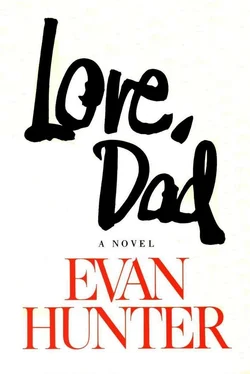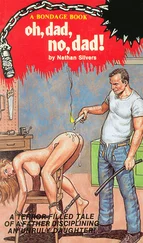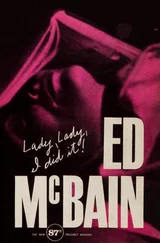They took a stroll through the town of Rutledge late that afternoon. Diana Blair was a good deal younger than her husband (“Younger by at least twenty years,” Connie later suggested), an attractive, shapely brunette who prattled on brainlessly about how much she envied their living in the city, where a person could step out of his front door and drop into a Broadway show, or a concert, or an opera, or a gallery opening, or a first-run movie — the usual suburban-dweller’s plaint. Jamie was surprised to hear Connie, his wife of almost seventeen years at the time, his wife whom he thought he knew better than anyone else on earth, saying she would much prefer living out here in the country, with all these glorious fall leaves overhead and underfoot, and the joy of a snow-clad winter (her actual words), the promise of daffodils in the spring, the subsequent sounds of summer insects chirping in the tall grass — the usual city-rat’s plaint, delivered in what Jamie secretly called Connie’s “Vassar Asshole” voice, somewhat nasal and entirely unmodulated, except that this time it was accompanied by a flash of green eyes as brilliant as a jungle glade: she actually meant what she was saying.
“If you’re serious about this...” Lester said.
“Oh, I am. I would adore living in this town,” Connie said. “Adore” was one of her favorite words. She rolled it off her tongue lovingly, kissed it breathily onto the air like the promise of those spring daffodils she’d been anticipating three minutes earlier.
“There’s a great old house for sale here,” Lester said.
“Right on the river,” Diana said.
“Would you like to take a look at it? I know the owner, I’m sure he...”
“Thanks,” Jamie said, “but I think...”
“I’d like to see it,” Connie said.
The house was owned and occupied by a surgeon and his wife who, now that all their children were grown and married, were planning retirement in Arizona. The surgeon’s hands shook as he showed them around; perhaps a better reason for retirement, Jamie thought, than all those grown and married children. The house had been a working sawmill during the Revolution (“Our Revolution, not the one in Russia,” the surgeon said) and had been converted into a residence in 1910 by a portrait painter who’d also renovated the old barn into a studio for himself, complete with a skylight streaming good northern light.
Connie kept marveling at everything. She loved the old beams and posts, the kitchen with its brick countertops and pegged floors, the attic bedroom with its peaked ceiling supported by beams actually sawn at the old mill, the huge living-room fireplace with its barn-siding façade, the large deck overhanging the river, the spacious lawn rolling away to a rock garden the painter’s wife had designed herself and planted away back in 1923 (a small bas-relief raven was set as a plaque into the rocks, bearing the chiseled legend MARTHA’S ROCK GARDEN, and the date, and the painter’s chiseled signature below it), the stepping-stones across the river, the stand of pines bordering the rock wall that defined the property, and far on the horizon the graceful steeple of the First Presbyterian Church.
“I adore it,” Connie said.
In the car on the way back to the city, she first asked how old Jamie thought Diana Blair was, offered her own opinion about the twenty-year gap between her and her husband, and then asked Jamie if he was seriously thinking of letting Blair do a special based on his photographs; from what she’d been able to gather by asking a few discreet questions before they drove up here, Blair had produced nothing but utter crap on television for the last six years, ever since he’d left his job at NBC in 1961.
“Where’d you ask all these discreet questions?” Jamie said.
“I asked Annie Baumgarten, whose husband is in programming at ABC, and I asked Sylvia Janus, who works for William Morris, and they both said—”
“Why didn’t you tell me this before we came all the way up here?”
“It’s not that far up, and besides I wanted to see for myself. Are you going to let him do it?”
“Let’s see what he comes up with.”
“He certainly came up with a good house,” Connie said. “Maybe he should go into real estate.”
“I didn’t think it was all that great,” Jamie said.
“Come on, it was only magnificent.”
She got off the subject almost at once, asking him what he’d thought of Blair’s comment about “prestige,” as if Jamie needed prestige, asking him what he thought of the idea of Blair writing the monologue, did he have any writing credits at all, and then suddenly — with another flash of these glade-green eyes — saying, “How much do you think they want?”
“How much do I think who wants?”
“Old Dr. Gillespie and his wife.”
“For the house, do you mean?”
“No, for the fucking rock garden. Of course for the house.”
“Fucking” was a word Connie had first picked up from her older sister Janet, who was now married to a film editor at Universal and living in Brentwood, and had later heard used with some regularity by her Vassar roommate, a girl who’d grown up on exclusive Lake Shore Drive in Chicago. Connie used the word frequently, but never when she was actually doing what it defined. She called that “screwing.”
“So?” she said. “What do you think?”
“Who cares how much they want for it?” Jamie said.
“It would be closer to Lissie’s school.”
They moved into the house on the sixth day of December in 1967, and for Lissie’s sixteenth birthday Jamie festooned the living room with pictures he’d taken of her that year, forty-eight of them in all, some of them tacked to the old posts, the rest Scotch-taped to the walls between the paintings he and Connie had collected since 1953, when Life had been good enough to launch his career. But forty-eight pictures weren’t sixty pictures, and tonight he’d run out of wall and post space before he’d hung little more than half of them.
He got his brilliant idea along about midnight, went down to the basement for a spool of fishing line he’d never used, fifteen-pound clear test, and strong enough to land a battling swordfish, or so Kirk Harkins at the hardware store in town had told him. He then cut himself snippets of line which he threaded through the holes he made in the two top corners of each mat. Standing on a ladder, he tacked the steepled lines to the ceiling beams, spacing the pictures some six inches apart, twisting the separate hanging lines around each pushpin till he got a level dangle. The job was going to be painstaking and time-consuming; he began to understand how Michelangelo must have felt in the Sistine Chapel.
When next he looked at his watch, it was twenty minutes to two, and there were still three pictures to hang. One of them was a terrific shot he’d caught of six-year-old Lissie in Central Park one bright spring day, kneeling to pluck a dandelion from the ragged lawn. Another was of her in a flaking and rusting rowboat, the first (and last) summer they’d spent at Martha’s Vineyard, back in 1965 when she was almost fourteen, long slender arms tugging at the oars, tiny buds of breasts in the tanktop bathing suit. Her breasts, at seventeen — yes, she was already seventeen; she’d been born at 1:27 A.M. on the morning of December 19, 1951 — were still somewhat less than spectacular. At school, she and her similarly unendowed roommate had formed a club they called the Itty-Bitty Titty Committee, clandestinely referred to by its dozen or more titless members as the I.B.T.C., lest the Establishment close them down in a wink.
Читать дальше












